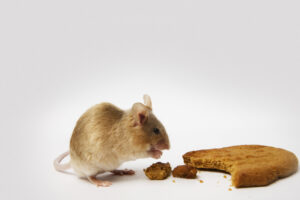When you see a mouse dart across your room, do you experience a fight or flight response? Whichever direction you go, when the moment passes, the next thought usually re-aligns the fight and flight responders: the food!

How long can mice go without water?
Even though mice are dependent upon water for survival, the ways they can go about taking water in can be either direct or indirect.
Direct water
Mice can get direct water from streams, lakes, puddles, or other natural water sources in the wild. In your home, they can get that from water left behind in sinks, condensation around pipes in the walls, water in drains, or often overlooked sources such as pet water dishes.
Indirect water
Believe it or not, mice can go a month or more without directly consuming water. There usual mode of hydration is extracting water from the food they consume. Even foods that seem dry enough to us to warrant chasing it with a glass of water will have enough water to sustain a mouse.
How long can mice go with out food?
Mice are much more dependent upon food than water. They can only go 2-4 days without food of some sort. Keep in mind that this does not mean they need to sit down to a full fest. Mice like to nibble. They will likely eat a morsel or two and then maybe take a few for the road and be just fine. Find more details on what mice like to eat here.
Wild vs home
The amount of time mice can survive without food will depend a lot on the environmental conditions. For example, a mouse in the wild in cold fall temperatures having to sprint from one hiding place to another avoid predators will have high energy needs. While on the other hand, mice cozied inside of a predator free residence with a plethora of food close by will need far less energy.
Starving them out
Once you have cleaned up scattered crumbs and sealed all food containers, can you be confident in a 2-4 day waiting game? Unfortunately, the answer is no. If mice have access to water instead of food, they can extend their survival time beyond the normal range. Most of our homes have more than enough water for mice in this regard.
Beyond the above survival mode, mice have other means of collecting food. Oftentimes, they will have at least a small store of food in some difficult or impossible to reach (by humans at least) places. In addition to storing food, they can also feed off of things such as live or dead insects, underground fungus, seeds, or even their feces.
Bringing it together
Food control is key to controlling mice, but is not the only answer. A constant supply of food can be the source for population expansion sustainment. Once food is protected, the next step is to put together trapping and/or baiting measures to take care of the mice at hand. Finally, no rodent control is complete without blocking off the potential entry points.
Consider a professional
If this is something that recurs or you simply don’t want to deal with it, don’t hesitate to reach out to a Rove Pest Professional to restore proper order.